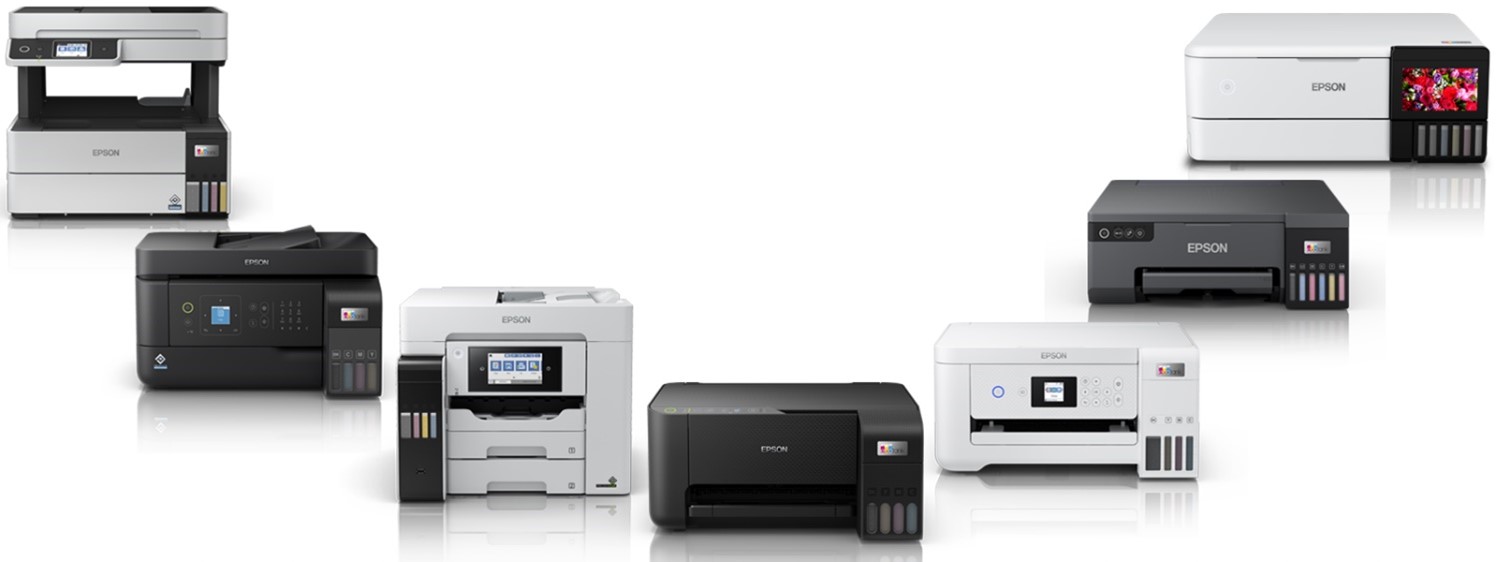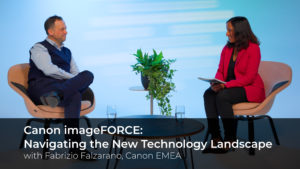
Epson’s 100 Million EcoTank Printer Milestone: A Sustainable Achievement
November 22, 2024
Sustainability, Article, Trends
Epson recently announced that it has sold more than 100 million EcoTank printers worldwide. Originally launched in 2010 and now sold in 170 countries and regions, Epson’s high-capacity ink-tank home-office inkjet printers offer an alternative to conventional cartridge-based print consumables, claiming cost, convenience, and environmental advantages.
Epson’s milestone is a notable achievement in an industry working hard to promote its sustainability credentials. Vendors are innovating in both product design and delivery and, through corporate impact reduction programmes, aiming to help customers meet sustainability targets while ensuring the continuing relevance of print.
The company has also become the first Japanese manufacturer to transition its entire business to 100% renewable energy sources. It has clear short- and long-term targets for emissions reductions, aiming for a 34% reduction in direct emissions by the end of 2025. In October 2024, it announced it had gained third-party validation of its activities by achieving an EcoVadis Platinum rating.
Epson has ambitious net-zero and consumption reduction targets. The company aims for a 34% reduction in direct emissions by the end of 2025 and to be carbon-negative and underground resource-free by 2050. In 2024, it announced it had become the first Japanese manufacturer to transition its entire business to 100% renewable energy sources.
Striving for a sustainable print industry
Print technology vendors operate in a complex, interdependent sustainability landscape. They must consider environmental impacts both during the lifecycle of their products – including consumables, energy, and paper consumption – and within their own manufacturing and sales operations. The sector is subject to many regulations and standards for technology manufacture, performance, and end-of-life management. Some of these, such as Energy Star, Blue Angel, and the WEEE Directive, have existed comparatively long. Vendors are also increasingly influenced by customers that want suppliers to help them meet environmental impact reduction targets.
As a result, the print industry is relatively mature in its sustainability focus compared to many other technology sectors. Circular economy principles are well-understood, and many vendors are making good progress against targets for reducing raw material consumption, increasing post-consumer recycled plastic content, minimising packaging and transport impact, and recycling or remanufacturing devices.
However, one of the most interesting areas is the technology innovations that companies are bringing to market to differentiate their devices on environmental grounds. Here, Epson has innovations in both its home office and business portfolios:
- EcoTank. In hitting its 100 million-unit milestone, Epson has validated its introduction of the refillable ink tank system. Its ink bottles mean no ink refills for up to three years and claim to cut costs by up to 90%. Replacing numerous complex, multi-component cartridges with simple plastic bottles means zero cartridge waste. It eliminates a considerable burden of raw material consumption, manufacturing, shipping, and end-of-life waste management.
- Heat-Free technology. Epson’s Heat-Free Printing Technology uses no heat in the ink ejection process and does not have a fixing phase, reducing power consumption compared to conventional laser technology, which uses heat in both these stages. Epson also states that its technology requires fewer replacement parts than typical laser systems.
A key challenge for Epson is addressing buyer perceptions of inkjet technology compared to laser technology. Epson has invested considerably in promoting its EcoTank range, with an advertising campaign featuring world-record sprinter Usain Bolt. It also offers a sustainability Optimisation Tool for resellers, allowing them to quantify the emissions reductions achievable by customers planning to switch their print fleet to Epson’s Heat-Free alternative. Epson’s channel partners widely use this tool, and it responds to customer demand for clearer information about the environmental performance differences between products.
Quocirca research shows that enterprise buyers are looking for these top three features when making decisions through a sustainability lens: energy efficiency, longevity, and sustainable ink or toner. Epson is in a strong position to fulfil these requirements, with its Back2Life extended warranty scheme for business printers answering the goal of longevity.
Office-based circularity
Epson is also exploring bringing circularity to individual office level with its PaperLab solution. The Epson PaperLab A-8000 is a secure office paper recycler that turns waste paper into new paper using a virtually dry process. This system uses about 1/100th of the water needed to produce the same amount of ordinary paper. In October 2024, Epson announced the release of the A-8100 PaperLab Refresh Model, which also enables users to monitor their environmental impact through Epson’s cloud solution.
While the price point for this solution currently puts it out of range for many organisations, it positions Epson well for the future in supporting a circular economy office concept.
Device circularity: closed-loop ambitions
Epson has developed a competitive position regarding device circularity and aims to close the resource loop. It is increasing the amount of recycled plastics used in its products, with the latest launches of EcoTank home printers, WorkForce Pro office printers, and WorkForce business scanners featuring up to 30% recycled plastic. It is also building momentum around initiatives to refurbish EcoTank printers for resale through eBay stores and service partners.
Remanufacturing and refurbishing strategies are gathering significant momentum in the market. Regulation is a partial driver of the market for remanufactured devices, with recent French legislation mandating that a proportion of technology purchases comprise remanufactured or refurbished goods.
Many vendors also focus on design for reuse as they seek to underpin future remanufacturing programmes with easy-to-reuse components.
Quocirca opinion
Innovations such as EcoTank and Heat-free printing are a point of differentiation in a market where customers are actively looking for suppliers that will positively impact their environmental footprint. As always, there is a balance to be struck between replacing fleets with new technology and extending existing devices, but with its Optimisation Tool, Epson is going some way to providing the data customers need to help with that decision process.
Epson has a robust sustainability approach supported by a strong corporate strategy and good circular economy progress.
The challenge for Epson and print vendors in general is to draw together all their initiatives across the full print lifecycle and corporate performance sphere to provide a complete impact position for their solution that enables genuinely meaningful comparisons. This is far from easy.
Industry challenges are also better tackled multilaterally than in isolation. These include influencing national government and EU policies on technology manufacturing, procurement, standards, and end-of-life management. Like other vendors, Epson is part of various alliances and partnerships designed to advance sustainability. It joined Quocirca’s Sustainability Dinner in July 2024 to contribute to constructive conversations about promoting sustainable practices in print.
For more information about becoming a Quocirca client, click here.




